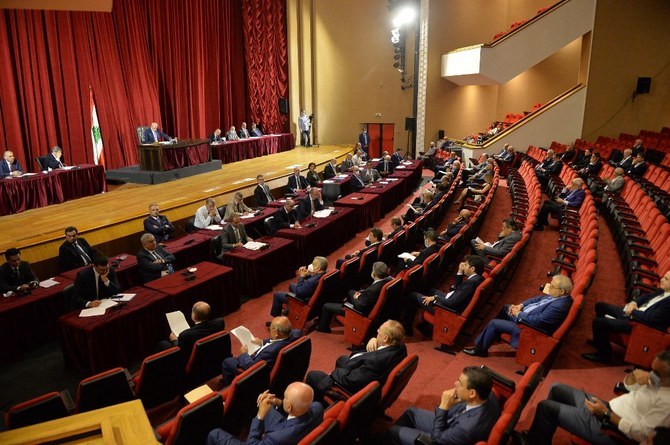
By Najia Houssari – arabnews.com — BEIRUT: The Lebanese parliament’s session was adjourned on Wednesday after protesting depositors threw stones at deputies and insulted them for continuing to discuss the capital control bill. The government amended the draft bill and sent it to parliament for a second time, but no agreement was reached and the session was cut short. Formal capital controls are an International Monetary Fund policy recommendation, and Lebanon hopes to secure an IMF aid package after its financial system imploded in 2019, paralyzing the banking system and freezing depositors out of their US dollar accounts. Some politicians from the Lebanese Forces Party and the Free Patriotic Movement refused to discuss the draft law before reviewing the “economic recovery plan,” which they say “is trying to swallow up the rights of depositors.”
George Adwan, the head of the Parliamentary Administration and Justice Committee, said: “The plan will write off $60 billion of debt, and the depositors will bear the losses.” He called for “a plan that defines responsibilities first, and then searches for capital control,” adding that any research “outside the path of determining responsibilities and distributing losses means taking the country into the unknown.” Ibrahim Kanaan, head of the Parliamentary Budget Finance Committee, said: “How can we freeze the deposits while we do not know what is left of them? People have rights that must be preserved. The depositor should not be held responsible for the state’s wear and tear, but rather the Bank of Lebanon, private banks and the state.” Meanwhile, Elie Ferzli, the deputy parliament speaker, defied depositors who were protesting in the street by ramming them with his car as he drove into the parliament courtyard. They responded by throwing stones and shouting at him. Footage of the incident went viral on social media. As he was leaving the meeting hall, Ferzli mocked the protesters, telling a journalist he was “ready to do it again.”
At a press conference after the session, the deputy speaker said: “Parliament is one of the staunch defenders of the rights of depositors, and there is an article in the draft law that establishes exceptional and temporary controls on bank transfers and cash withdrawals that do not prejudice the rights of depositors or the assets of their deposits.” Economics expert Dr. Jassim Ajaka told Arab News: “There is a kind of chaos and political confusion in dealing with the issue of depositors’ money, and it seems that the state has abandoned its responsibilities. “I have read the economic recovery plan many times and did not find in it any guarantee of the rights of depositors of $100,000 or less, in the various proposed formats. The depositors’ money is not protected, and in return, there is an exoneration of the state from all previous crimes.”
Ajaka said that if all the assets of the banks were sold, the returns would not cover the value of the deposits. Commenting on Ferzli’s actions, he said: “How during the 2017 uprising, no MP dared to challenge the protesters, but today they seem unconcerned as if they are telling people: Nothing will change.” The requirement to approve a capital control law is a prerequisite for the IMF to proceed with its cooperation program with the Lebanese government.
Meanwhile, Ettie Higgins, UNICEF acting representative in Lebanon, warned in a statement that the country’s health system had reached the point of collapse because of multiple crises, and that many families no longer had access to primary healthcare for their children. “A massive exodus of health workers, with the stagnation of the recruitment process from health institutions in the country, and restrictions on the import of medicines and medical equipment seriously affected the quality of healthcare for women and children,” she said. “The routine vaccination of children decreased by 31 percent, which exposes them to diseases and their dangerous effects.”



